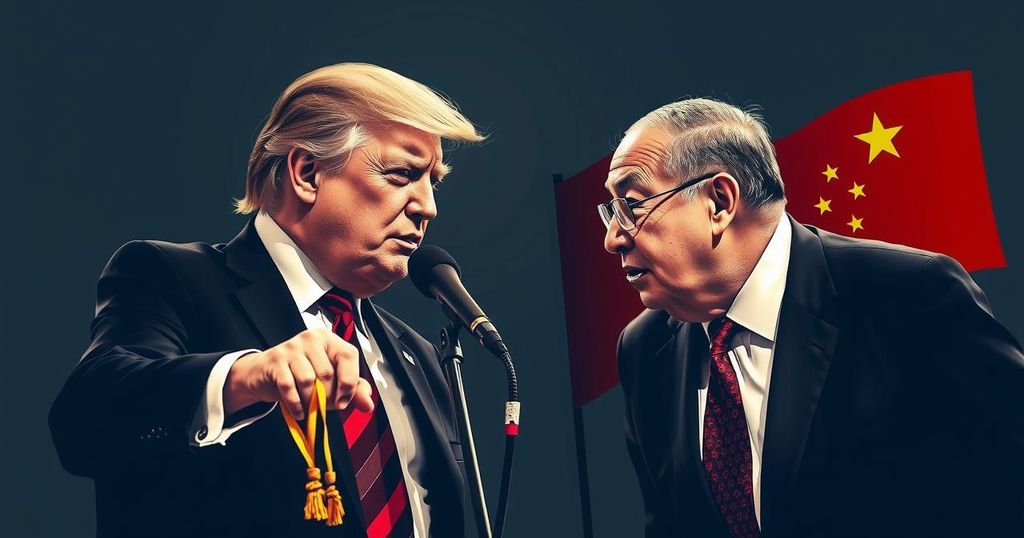Trump’s 100% Tariff Threat on BRICS Nations Over Dollar Replacement Concerns

President Trump has threatened a 100% tariff on BRICS nations if they pursue currency alternatives to the U.S. dollar, highlighting ongoing tensions surrounding dollar dominance in global trade. The BRICS group, formed to support emerging economies, is exploring new currency options amid calls for reduced reliance on the dollar but faces difficult challenges in establishing a viable alternative. Tariffs could inflate prices for U.S. consumers and cast doubt on American economic power.
On November 30, President-elect Donald Trump issued a stark warning of a potential 100% tariff against the BRICS nations, which consist of Brazil, Russia, India, China, South Africa, Egypt, Ethiopia, Iran, and the United Arab Emirates. Trump articulated that these tariffs would be enacted if these countries attempted to establish an alternative currency to the U.S. dollar or supported a rival reserve currency. “We require a commitment from these Countries that they will neither create a new BRICS Currency, nor back any other Currency to replace the mighty U.S. Dollar or, they will face 100% Tariffs,” he declared via Truth Social.
The formation of BRICS, initiating in 2009 with Brazil, Russia, India, China, and South Africa, aimed to foster emerging economies’ interests and lessen their dependence on the U.S. dollar, which dominates global transactions. The dollar’s supremacy affords the U.S. significant advantages such as reduced borrowing costs and substantial geopolitical leverage. Recent calls by leaders like Russian President Vladimir Putin for a new global payments system illustrate the ongoing dialogue about de-dollarization. Despite calls for a new currency, experts contend that a competitive alternative would face formidable challenges, given the dollar’s entrenched status as the world’s primary reserve currency.
Creating a viable BRICS currency poses significant hurdles due to the U.S. dollar’s overwhelming use in global trade, which accounts for approximately 58% of foreign exchange reserves. As Mark Weinstock, a global trade expert, stated, “Economically, it’s not a major issue because the idea of the BRICS countries being able to put together an alternative as a reserve currency for the U.S. dollar is not plausible in the short or intermediate term.” Political and technical complexities further complicate any efforts towards a unified currency. Notably, South Africa’s government has already distanced itself from notions of establishing a BRICS currency, asserting that discussions are centered on trading using national currencies.
If enacted, Trump’s proposed tariffs would likely have adverse effects on U.S. consumers, inflating prices for goods imported from BRICS nations. Economists suggest that such tariffs could intensify inflation, adversely affecting the cost of everyday items sourced from these countries, including coffee, electronics, and clothing. Critics of Trump’s tariff threats argue that they portray the U.S. as weak and may inadvertently accelerate a shift away from the dollar as a global reserve. Brad Setser, a senior fellow at the Council on Foreign Relations, stated, “It makes the use of the dollar appear to be a favor to the U.S.”
The BRICS nations, formed initially by Brazil, Russia, India, China, and South Africa, were established to support the interests of emerging economies and reduce dependence on the U.S. dollar, which is predominantly used in global trade. The dollar’s primary position grants the United States several economic and geopolitical advantages. As tensions rise over potential alternatives to the dollar, discussions amongst BRICS leaders surrounding the creation of a new currency have intensified, coinciding with U.S. tariffs on imports and political maneuvers by President Trump that leverage economic policies in favor of American interests.
In summary, President Trump’s threat of a 100% tariff on BRICS nations arises from concerns about their attempts to undermine the dominance of the U.S. dollar. While there is interest among BRICS members in developing an alternative currency, significant obstacles, including the dollar’s entrenched status and varied political will among member states, present challenges. Economically, imposing such tariffs could result in long-lasting repercussions for U.S. consumers, increasing prices and potentially threatening the dollar’s position in global finance.
Original Source: www.cbsnews.com








